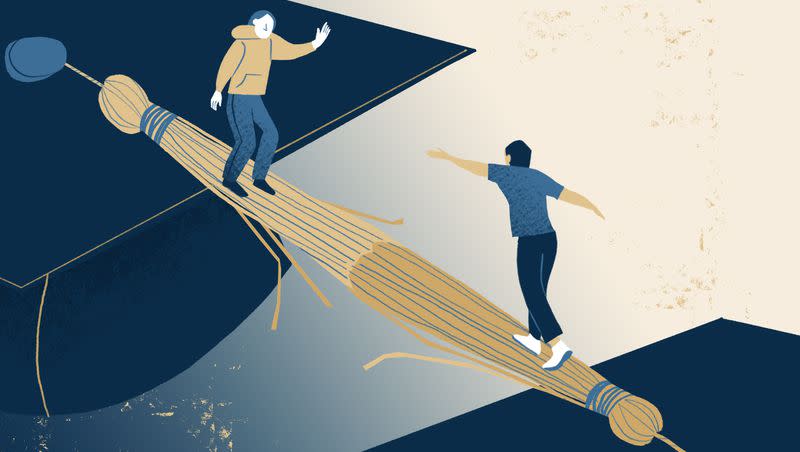Perspective: How higher ed can help resolve our tribal conflicts

In April 2022, a high school junior named Sungjoo Yoon wrote a remarkable op-ed for The New York Times. It was about a school board meeting in his hometown of Burbank, California.
The Burbank school district had just removed a number of titles from its mandatory curriculum because school officials, prompted by complaints from some parents and students, felt that they caused harm to Black students.
The books included Mark Twain’s “Adventures of Huckleberry Finn,” Harper Lee’s “To Kill a Mockingbird” and John Steinbeck’s “Of Mice and Men.”
Yoon had gone to the school board meeting to express some views and to try to understand the decision better. He’d already read many of the books and found himself deeply moved by them, so moved that he decided to join racial justice efforts. But he understood that every school district needs to make decisions about a curriculum — after all, not everything can be included, and not every book is appropriate for every age group.
Yoon knew this from personal experience. He’d found himself reading “The Rape of Nanking” when he was 10 years old, and it gave him nightmares.
He’d also been tracking the curriculum debate in other communities and knew that lots of schools were taking books off the mandatory reading list — but concerns about racism were not the reason. Rather, in towns like Gansbury, Texas, 130 books were removed because of “pervasively vulgar” content, which he saw as thinly veiled code for LGBTQ material.
Yoon had questions, and some thoughts. He wanted to share his experience reading the books that had moved him. He wanted to hear about exactly what disturbed other people about the same books. He wanted to think with others about the differences and similarities of what was taking place in Burbank and Gansbury.
He did not get a chance to do any of that.
Instead, as he describes it, “I witnessed the public forum — made up mostly of parents, administrators and educators — devolve into tribalist dissension. The meeting quickly became a two-sided shouting match pitting supposed ‘freedoms’ against purported ‘justice.’ There was plenty of arguing but no meaningful discussion …”
That scene sums up too much of American life today. Civic institutions that we simply expect to work are melting down in tribalist fury. My great fear is that the infection of polarization spreads, and institutions everywhere get the disease. Imagine if firefighters decide they disagree too much on immigration policy to fight fires together, or nurses who come down on different sides of Middle East politics refuse to treat patients with one another.
This is a crisis, and we need help. Who should we call? Here’s an idea: higher education.
I know, I know: higher education is often viewed as the left flank of our tribal conflict, but suspend that idea for a moment and pay attention to the potential.
Our college campuses gather people of diverse identities and divergent ideologies in a space with common activities — from biology classes to intramural badminton — that have the potential to shape cooperation. Colleges help the nation set its civic priorities (think service-learning in the 1980s), graduate leaders who make these priorities a reality across a range of sectors, and advance a knowledge base that help practitioners do their work better.
So what might happen if higher education took on bridge-building? What if a school board in the middle of meltdown could call the local college president and say, “Hey, we’d love to hire some of your graduates to help facilitate some really contentious issues in our school district. We know you prepare them to handle the really hard things.”
Related
Building bridges: What higher education owes a religiously diverse democracy
Perspective: What people get wrong about political polarization
This was the topic of a remarkable gathering of bridge-building organizations and higher education association presidents that was assembled by a group called More Perfect and the organization I run, Interfaith America.
In my opening remarks, I quoted two great Catholic philosophers on the role of higher education in a diverse democracy.
The first is John Courtney Murray, who defines civilization as a conversation, the act of “living and talking together.” Barbarism is its opposite, “the lack of reasonable conversation according to reasonable laws.” According to Murray, colleges are special places because they have the potential to model civilization to the extent that diverse views can be “at war intelligibly.”
The second Catholic philosopher is Alasdair MacIntyre, who agrees with Murray on the special role of higher education. Any diverse society will have a range of legitimate conflicts, he said, and the role of the university is to “initiate” its students into these conflicts and then teach them how to have reasoned discussions about them.
MacIntyre then goes on to say that “only from the university can the wider society learn how to conduct its own debates …”
Let us recover this earlier notion of the purpose of a university and employ the considerable resources of our sector of higher education in helping us resolve the conflicts that plague our civic spaces. We owe it to students like Sungjoo Yoon — and ourselves.
Eboo Patel, the founder and president of Interfaith America, is a contributing writer for the Deseret News, the author of “We Need to Build: Field Notes for a Diverse Democracy” and the host of the podcast “Interfaith America with Eboo Patel.”

